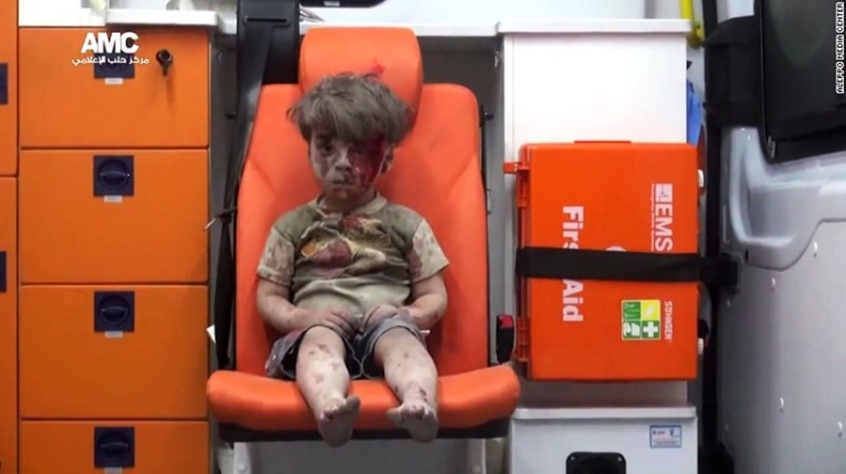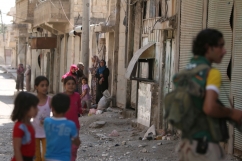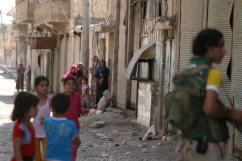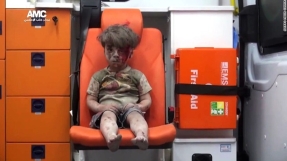
Staring out of the front page of our newspapers on Friday morning was Omran Daqneesh, a dazed five-year-old coated in dust, a crescent of blood adorning one eye. He was "Syria's unwitting poster child" to the International York Times, "A symbol of Assad's war" for The Times, and "The face of horror" according to Spain's El Periódico.
It was not the first time that the photographer, Mahmoud Rislan, had cried while filming a traumatised child.
"Omran's affected me because he was silent," he explained. "He didn't cry. He didn't say a word. He was shocked."
Rislan hopes that photos of all the child victims of Syria's war go viral. "If people knew what it was like maybe the war will stop, the bombing will stop," he observed.
There is little doubt that the photo has elicited an emotional response, at least on social media, where people have voiced shock, horror, and pity. Many comparisons have been made to the image of Alan Kurdi, another small Syrian child, drowned in September while attempting to cross the Mediterranean with his family. Some commentators have vented their frustration with the response. Why this picture and not the many others captured daily? How long before the world moves on? Will anything actually change? "They are not dolls to cry over and then move on," wrote Zaher Sahloul, a Syrian-American doctor, in the Guardian. "That is the worst thing, everyone is looking at these pictures, but who will do anything?"
The reality is that most coverage of Syria goes unread. In an article entitled "You probably won't read this piece about Syria", Barry Malone, an online editor at Al Jazeera, described how the site's coverage of the five year anniversary of the conflict failed to attract readers. Since 2012, with the exception of "occasional spikes", mostly related to ISIL barbarity, there has been a "stagnation" in traffic to Syria stories. "The twisted steal the attention," he wrote. "And the people we should pay attention to fade into the background, bit players in a narrative wrongly and unfairly dominated by the grotesque."
While it is tempting to accuse the public of apathy, parochialism or a lack of compassion, my sense is that people avoid reading stories about Syria because of an overwhelming sense of powerlessness. The emotions aroused by stories of children dying are powerful, but where is the outlet? What can we do? Tony Benn used to talk about combining the flame of anger against injustice and the flame of hope that it's possible to build a better world. Without the latter, is is tempting not to feed the former any fuel.
With this in mind, here are some ways in which to respond to the plight of Omran Daqneesh, and all Syria's victims.
1. Pray
Prayer has to be our first response. We pray to a just God of infinite compassion. Pray for wisdom for those charged with negotiating peace. Pray for the many millions in need of aid, including the 4.8 million forced to flee the country. Pray for those trying to reach them. Pray for hearts and minds to be changed. In this moving episode of Desert Island Discs, the British surgeon David Nott describes performing life-saving surgery on an ISIS fighter in Aleppo. Challenged about this, he explains: "Maybe he might have changed his mind about things... He may find out that he was operated on by a Christian surgeon in hospital, and I hope he does find out." I also recommend watching this film from May 1940. It shows the response to King George VI's call for a national day of prayer: a queue of the faithful, snaking around Westminster Abbey. I would love to see us out in force for the people of Syria.
2. Give
The extent of the need in Syria, and in those countries hosting Syrian refugees, is overwhelming. The UN estimates that there are 13.5 million people in need of humanitarian assistance. Only a third of its appeal has been funded. Lebanon, a country half the size of Wales, is hosting more than a million Syrians: one in three people in the country is a refugee. I met some of them in February, visiting children attending a World Vision project that gives them a few hours of fun every day – a chance to make flowers out of cardboard, draw their homes back in Syria, and race each other with balloons. The country-wide appeal is just 19 per cent funded. I believe that choosing which charity to find is an important personal decision but would personally recommend Médecins sans Frontières (working within Syria) and Embrace the Middle East (working with refugees outside Syria). I'm a trustee of the latter.
3. Advocate
In his appeal to Guardian readers to fund the UN's refugee agency, written after his visit to a camp in Jordan, the author Neil Gaiman wrote that it was "rare that you know that you have picked the right side". Much of the commentary on Syria has emphasised the complicated nature of the conflict. "I can't hear this word any longer, especially from the religious leaders," one Syrian priest told me. He fears that it translates into "I don't want to do anything about it.". Ideas have been proferred. The late MP Jo Cox, a long-time champion of the Syrian people, called for a no-fly zone. This was echoed this week on Channel 4 News by David Nott. Jo Cox also called on the UK to airdop aid to besieged civilians. As a member of the UN Security Council the UK should be pushing it to enforce the resolutions already passed, including those demanding an end to attacks on civilians, the abandonment of sieges, and unimpeded access for aid deliveries, including operations from neighbouring countries without the consent of the Syrian government. Resolutions are going ignored. Write to your MP to demand the UK exert diplomatic pressure.
4. Bear witness
We are not terrorists," a Syrian man, Faisal, told me, shortly before I left his temporary home in Jordan. "That is what everyone thinks. We just care about our children's future. That is all." I truly believe that one of our duties as Christians is to try as hard as we can to learn the truth about what is happening in Syria. That is not always easy. There are competing narratives, claims and counter-claims about where blame lies, and deliberate attempts to conceal and deceive. But one of the most chilling themes in Samantha Power's book A Problem From Hell, her Pulitzer-prize-winning book about genocide, is the failure to believe testimony. "Alarming reports of atrocities are typically met with scepticism," she observes. I've seen first hand the passion with which Syrian refugees want to convey what they have endured. The father who told us how he had lost his mind in a detention cell; the woman who had escaped ISIS in the back of a cattle truck. Photographers like Mahmoud Rislan are desperate for the world to know what is happening inside Syria.
Articles that I have found helpful include:
This New York Times long read on The Assad Files.
These New Internationalist article on "Syria's Good Guys".
Jo Cox's speech on the vote on airstrikes and her call for a strategy.
I have found that the more I have read, the more passionate I have felt about giving and praying. I have also discovered amazing stories of bravery, including that of the civilian defence force ("White Helmets") that rescued Omran Daqneesh, and that of Mohammed, a 16-year-old who has just finished second from top in the entire country of Lebanon, in his secondary school exams. He spent six or seven hours every day doing his homework, translating it for his brothers and sisters. He is Syria's future. There is evil afoot in Syria, but there is also great good. Let's pray, give, and advocate until it triumphs.
Madeleine Davies is deputy news editor of the Church Times, writing in a personal capacity. Follow her on Twitter @MadsDavies
















